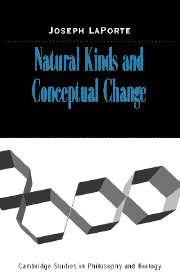Book contents
- Frontmatter
- Contents
- Preface
- Introduction
- 1 What Is a Natural Kind, and Do Biological Taxa Qualify?
- 2 Natural Kinds, Rigidity, and Essence
- 3 Biological Kind Term Reference and the Discovery of Essence
- 4 Chemical Kind Term Reference and the Discovery of Essence
- 5 Linguistic Change and Incommensurability
- 6 Meaning Change, Theory Change, and Analyticity
- Notes
- References
- Index
6 - Meaning Change, Theory Change, and Analyticity
Published online by Cambridge University Press: 10 December 2009
- Frontmatter
- Contents
- Preface
- Introduction
- 1 What Is a Natural Kind, and Do Biological Taxa Qualify?
- 2 Natural Kinds, Rigidity, and Essence
- 3 Biological Kind Term Reference and the Discovery of Essence
- 4 Chemical Kind Term Reference and the Discovery of Essence
- 5 Linguistic Change and Incommensurability
- 6 Meaning Change, Theory Change, and Analyticity
- Notes
- References
- Index
Summary
In the past few chapters I have emphasized that conceptual revision is often a blend of theory change and meaning change. Consideration of such revision has moved many philosophers to say, with W. V. Quine, that there is no difference between a change in theory and a change in meaning. Quine argues that there is no such difference in the course of attacking analyticity. I examine Quineanism in the present chapter.
Quineans are right to emphasize the importance of conceptual revision that is a combination of theory change and meaning change. But does this sort of conceptual revision show that there is no distinction between theory change and meaning change? I argue that it does not. In section (I), I argue that the relevant kind of conceptual revision provides no convincing grounds for rejecting a distinction between meaning change and theory change.
In section (II) I argue that most philosophers are committed to accepting the distinction between meaning change and theory change, because they are committed to analyticity. Kripke has convinced the generality of philosophers that there are necessarily true identity statements, as I have pointed out in Chapter 2. I argue in section (II) of the present chapter that those who accept Kripke's arguments for the necessity of identity statements associated with the causal theory of reference have committed themselves to analyticity. The commitment seems to have gone unnoticed. Indeed, philosophers have been encouraged by Kripke's work to dispense with analyticity.
- Type
- Chapter
- Information
- Natural Kinds and Conceptual Change , pp. 150 - 174Publisher: Cambridge University PressPrint publication year: 2003

